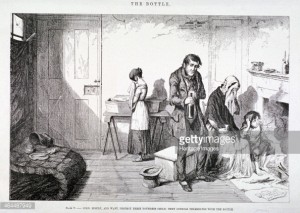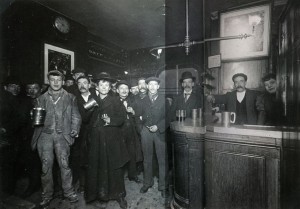May Owen (b.1896): Home and Family
May Owen belonged to a large family with 7 other siblings but was separated from them at the age of ten. As she and the two youngest siblings followed their alcoholic father to a Yorkshire Colliery Village, the other five and her mother remained in London for unknown reasons. Owen describes her oldest brother and sister’s occupation with a sense of pride of how well they have done for themselves as they both have reputable jobs: ‘my brother had worked his way from a messenger boy for a postman and then a Civil Servant in the foreign section at Mount Pleasant. […] My eldest sister took a post to a wealthy Lady in Kensington, as [her] personal maid and was with her many years and left a big legacy.’ (Owen, p.4)
 Apart from her father and mother this is the only real detail of her family that she gives to the reader of her letter. Her naval husband gets a brief mention but only that he died at some point in the 1940s most likely from the war looking at his occupation and the decade in which he deceased.
Apart from her father and mother this is the only real detail of her family that she gives to the reader of her letter. Her naval husband gets a brief mention but only that he died at some point in the 1940s most likely from the war looking at his occupation and the decade in which he deceased.
In pages 2 and 3 Owen describes the hardship that her father’s alcoholism put on their family. Owen still expresses though that he was a ‘brilliant man’ (p.2) which explains why it was only herself and two of the youngest siblings who followed him to Sheffield while the others refused, most likely due to the strain he had caused them. Julie-Marie Strange argues the point that autobiographers tend not to express any feelings but instead show their affectionate relationship through what their father did for them.
Owen states how her father ‘disgraced himself’(p.2), continuously losing jobs even though employers gave him second chances because of the sake of her ‘educated and dainty’(p.2) mother. Owen remembers the bars being opened all day where presumably her father spent most of his time and handed over his money to ‘tall golden haired barmaids’ (p.2).
Her father spent two years out of work until a club was formed for alcoholics. ‘I can remember Charrington the Brewers son forming a club for alcoholics my father was one of thirty sent to a small island off the Thanet coast Osea Island. No drink, his wage given to my mother and he had to help build a sea wall.’ (Owen, p.3). It is unclear whether this ‘club’ was court ordered or if it was a voluntary scheme but Owen states that her father was ‘sent’ to Thanet suggesting that he did not have a say in whether he would go or not. The club however allowed for her father to become healthy and able to send his wages back to Owen’s mother. Unfortunately for her father the allowance for the club stopped and Owen’s father was out of another job. By chance her father had a friend in Yorkshire who was able to offer him a post and finally bringing May Owen to Sheffield.
In the 1940s May Owen’s naval husband died (date of death and reason not specified). Due to this reason the newly widowed Owen was forced back into the workplace in order to support herself as she no longer had her husband to rely on as the breadwinner. It was typical for working-class men to bring in the breadwinner’s wage to keep the patriarchal order and have the women in the home sphere.
We are delighted that John Field has written about the work camp and inebriate retreat at where May’s father was sent for two years.
Bibliography
May, Owen. Autobiographical Letter. Burnett Archive of Working Class Autobiography, University of Brunel Library, Special Collection, 2:576
Strange, Julie-Marie. Fatherhood and the British Working Class 1865-1914. January 2015
Pictures: Pub – https://www.pinterest.com/pin/116530709084241246/
Cartoon – http://www.gettyimages.co.uk/detail/news-photo/the-bottle-1847-showing-an-interior-domestic-scene-with-the-news-photo/464487949

Leave a Reply